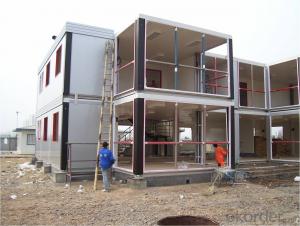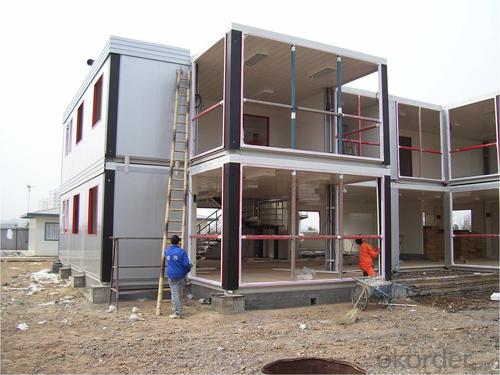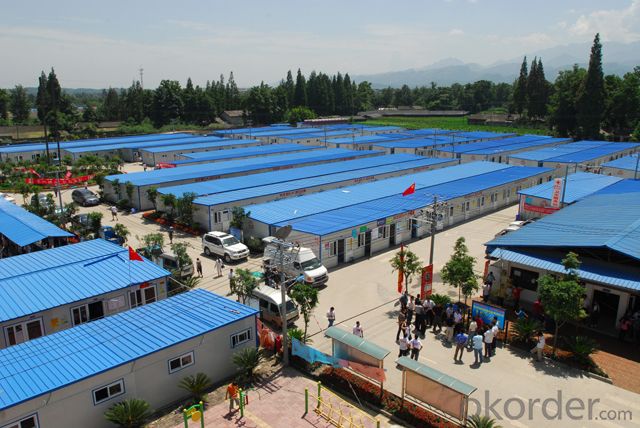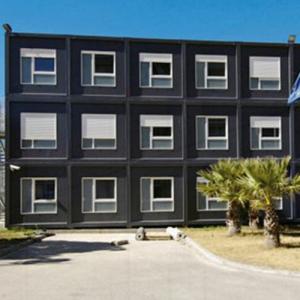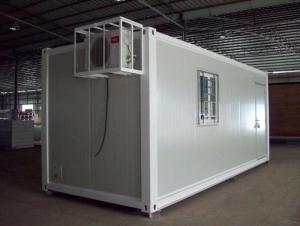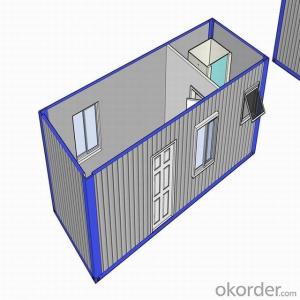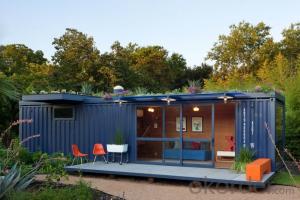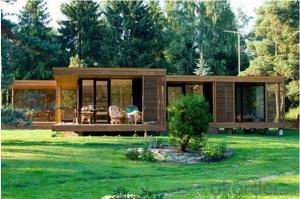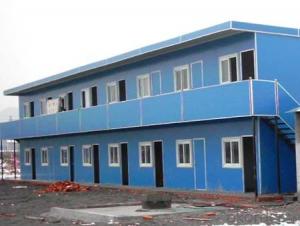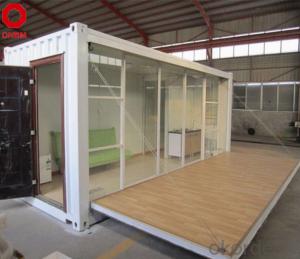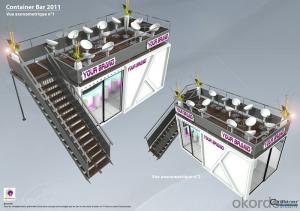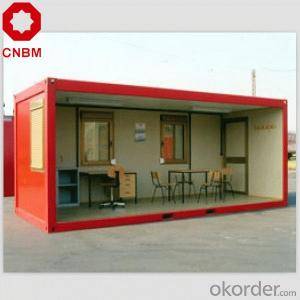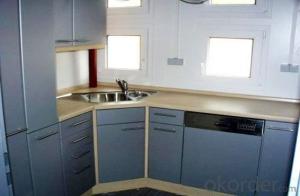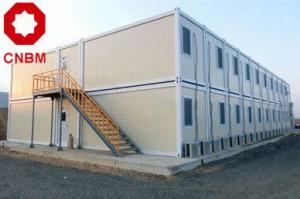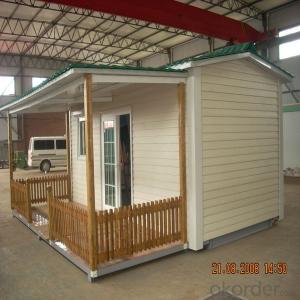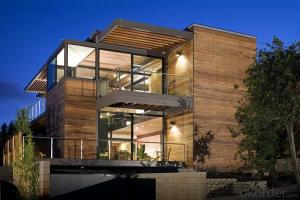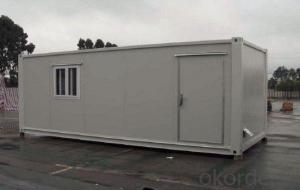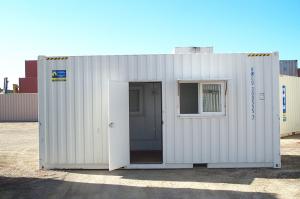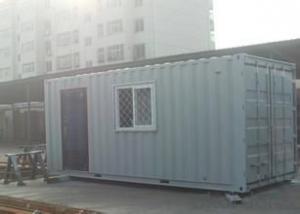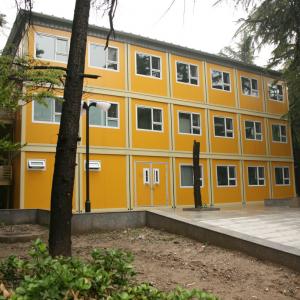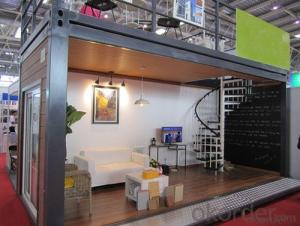Plastic Container House Prices with CE Certificate
- Loading Port:
- Tianjin
- Payment Terms:
- TT OR LC
- Min Order Qty:
- 3 set
- Supply Capability:
- 300 set/month
OKorder Service Pledge
OKorder Financial Service
You Might Also Like
Plastic Container House Prices with CE Certificate
1. The benefits of Container House
Perfect for modular/prefab site offices,cabins,warehouse,villa,toliet,shop,hotel,camp,office
Efficient, low cost designs that can be customized for end user requirements
Easy for low skilled workers to assemble
The light steel frame structure is strong and reliable
Many modular homes can be stacked and linked together to create more space
Neat inside: plumbing and wires are hidden into the sandwich panel
2. Certificates:
ISO9001, ISO14001, CSA(Canadian Standards Association), CE(European Conformity), AU(Australia Standard),UL(America standard)
3. Specification:
Item | Specification |
Frame | Cold formed 3-4mm Steel Profile Wind resistance capacity>120km/h, Seismic resistance capacity > grade 8 |
Floor | ·0.5 mm flat galvanized steel sheet ·100mm non combustible mineral wool ·18mmplywood panel ·Customized PVC floor |
Roof | 0.5mm galvanized &painted steel sheet ·100mm non combustible mineral woo ·one set CE electronic installation |
Door | ·Single fold, 40mm thick ·Insulated with PL (polystyrene) · Opening dimensions of 808×2030mm, with a handle lock with 3 keys. · Net opening dimensions: 754 x 1985 mm. |
Wall panel | ·0.5mm galvanized &painted steel sheet ·60mm rock wool ·9mm chipboard |
Window | Made of PVC, white color, with dimensions 800×1100mm, glazed with double layer glass with sliding mechanism (one side fixed and one sliding). More extra types chosen in term of your specific needs. |
The cabin can be dis-assemebled for transport.
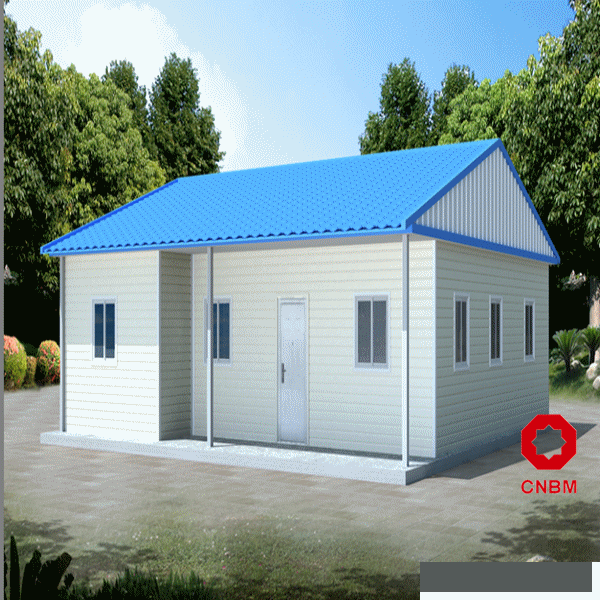
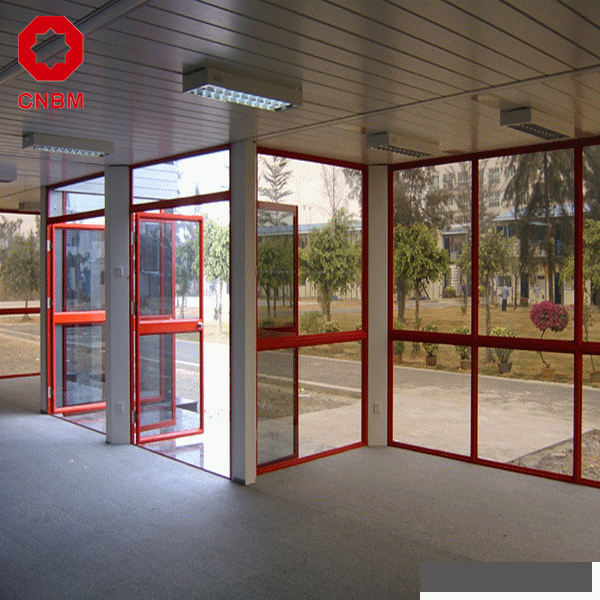
- Q: Are container houses suitable for communal or co-housing communities?
- Container houses can be a suitable option for communal or co-housing communities for several reasons. Firstly, container houses are highly versatile and can be easily customized to meet the specific needs and preferences of the community members. They can be arranged in different configurations to create shared spaces such as common areas, communal kitchens, and recreational areas. Additionally, container houses are relatively affordable compared to traditional housing options, making them more accessible for individuals who are looking to join a communal or co-housing community. This affordability can help create a more inclusive and diverse community, as it lowers the barrier to entry for individuals with limited financial resources. Container houses also offer sustainability benefits, which align well with the values of many communal or co-housing communities. These homes can be built using recycled materials, reducing the environmental impact of construction. Furthermore, container houses are energy-efficient and can be equipped with renewable energy sources such as solar panels, promoting a more sustainable and eco-friendly lifestyle for the community members. Furthermore, container houses can be easily transported and relocated, allowing communal or co-housing communities to adapt and grow over time. This flexibility enables the community to respond to changing needs and demographics without the need for significant structural modifications or expensive construction processes. However, it is important to note that container houses may have some limitations for communal or co-housing communities. The smaller size of container homes may result in limited personal space for individuals, and privacy could be a concern. Additionally, container houses may require additional insulation and ventilation systems to ensure adequate comfort and livability, especially in extreme weather conditions. Overall, container houses can be a suitable option for communal or co-housing communities due to their versatility, affordability, sustainability, and flexibility. However, careful planning and consideration of the specific needs and preferences of the community members are crucial to ensure that container houses can effectively accommodate communal living arrangements.
- Q: Are container houses suitable for educational or learning centers?
- Yes, container houses can be suitable for educational or learning centers. These structures offer versatility and can be easily modified to accommodate different educational needs. They are cost-effective, eco-friendly, and can be designed to provide a conducive learning environment with proper insulation, ventilation, and lighting. Additionally, container houses can be customized to include classrooms, libraries, laboratories, or meeting spaces, making them a practical choice for educational institutions.
- Q: Are container houses more affordable than traditional houses?
- Yes, container houses are generally more affordable than traditional houses. This is because containers are readily available, relatively inexpensive to purchase, and require less labor and time to construct compared to traditional housing materials. Additionally, container houses are highly versatile, allowing for cost-effective customization and potential savings on energy consumption.
- Q: Can container houses be built with a Scandinavian design?
- Yes, container houses can definitely be built with a Scandinavian design. The key to achieving a Scandinavian design in a container house is to focus on simplicity, functionality, and natural elements. Scandinavian design is known for its minimalist and clean aesthetic, with an emphasis on natural light, organic materials, and a connection to nature. When designing a container house with a Scandinavian style, one can incorporate features such as large windows to maximize natural light, light-colored walls and floors to create a bright and airy atmosphere, and an open floor plan to enhance the sense of space. Additionally, using natural and sustainable materials like wood and stone can add warmth and authenticity to the design. Scandinavian design is also characterized by functional and efficient use of space. Container houses are inherently compact, so it aligns well with the principles of Scandinavian design. Clever storage solutions, multi-purpose furniture, and minimalistic decor can help create a functional and well-organized living space. In summary, container houses can be built with a Scandinavian design by focusing on simplicity, functionality, and natural elements. By incorporating features like large windows, light colors, natural materials, and efficient use of space, it is absolutely possible to create a container house that embraces the timeless beauty of Scandinavian design.
- Q: Can container houses be built with a flat roof or a pitched roof?
- Yes, container houses can be built with either a flat roof or a pitched roof. The choice between the two depends on various factors such as personal preference, climate conditions, and the intended use of the container house. A flat roof design is commonly used in container houses due to its simplicity and cost-effectiveness. It provides a modern and minimalist aesthetic, and it allows for easy installation of solar panels or rooftop gardens. However, it is important to ensure proper insulation and waterproofing to prevent leakage and heat transfer. On the other hand, a pitched roof design can add a traditional or architectural touch to a container house. It offers better drainage, snow load resistance, and natural ventilation. Additionally, a pitched roof allows for the installation of attic space or loft areas, providing more interior vertical space. However, constructing a pitched roof may require additional structural modifications and expertise. Ultimately, the choice between a flat roof or a pitched roof for a container house depends on the specific requirements and preferences of the homeowner. Consulting with a professional architect or contractor can help determine the most suitable roof design for the container house project.
- Q: What are the design options for container houses?
- The design options for container houses are diverse and versatile. They can range from a simple, minimalist layout to a more complex and spacious design. Some popular design options include open floor plans, multiple levels, and creative use of windows and doors for natural light. Additionally, container houses can be customized with various exterior finishes, such as cladding, paint, or even green roofs, allowing for a wide range of aesthetic possibilities.
- Q: Can container houses be designed with a yoga or meditation space?
- Absolutely, container houses can be specifically designed to include a dedicated area for yoga or meditation. These houses offer a great deal of customization, allowing for modifications to suit various purposes, including the creation of a serene and tranquil space for these activities. By employing some creativity and effective planning, the limited space within a container house can be optimized to provide a dedicated area for yoga or meditation. To design a container house with a yoga or meditation space, it is important to consider several factors. Firstly, the size of the container will determine the available space for the yoga or meditation area. Containers can be joined or stacked together to create larger spaces, which can be advantageous for accommodating larger groups or incorporating additional features such as windows or skylights to allow for natural lighting. The layout and interior design must be optimized to create a calm and serene atmosphere. This can be achieved by utilizing soothing color schemes, natural materials, and incorporating elements like plants, soft lighting, and natural ventilation. It is also essential to ensure that the space is well-insulated to provide a quiet and peaceful environment, free from external disturbances. In terms of functionality, the yoga or meditation space should offer enough room for movement and stretching. It should be free from clutter and distractions, allowing for focused practice. Additionally, storage solutions can be integrated into the design to keep yoga mats, cushions, and other equipment organized and easily accessible. Lastly, the container house can be designed to have direct access to nature, such as through large windows or a sliding glass door that opens up to a garden or outdoor space. This connection to the outdoors can enhance the overall experience of practicing yoga or meditation. In conclusion, container houses can be purposefully designed to include a dedicated yoga or meditation space. With careful planning and thoughtful design, these houses can provide individuals or groups with a peaceful and functional environment to cultivate mindfulness and relaxation.
- Q: Are container houses resistant to corrosion or rust?
- Container houses are generally resistant to corrosion or rust due to their construction with corten steel. This particular type of weathering steel contains elements like copper, chromium, and nickel, which create a protective layer when exposed to the elements. This layer serves as a barrier against corrosion and rust, ensuring the longevity and durability of container houses. Additionally, anti-corrosion coatings are often applied to the steel used in container houses to further enhance its resistance to rust. However, it is crucial to note that proper maintenance and regular inspections are still necessary to preserve the integrity of the container house, particularly in coastal or highly humid regions where the risk of corrosion may be elevated.
- Q: Are container houses suitable for remote work or telecommuting?
- Yes, container houses can be suitable for remote work or telecommuting. Container houses are often designed to be versatile and can be customized to create a comfortable and functional workspace. With proper insulation, heating, cooling, and ventilation systems, container houses can provide a conducive environment for remote work. Container houses can be easily modified to include dedicated office spaces or workstations, equipped with all the necessary amenities like desks, chairs, shelving, and storage. Additionally, they can be designed to have sufficient natural light and views to create a pleasant working atmosphere. One of the advantages of container houses is their portability. They can be transported to remote locations, allowing individuals to work from anywhere they desire. This flexibility is beneficial for those who prefer a change of scenery or need to move frequently for work. Furthermore, container houses are often cost-effective compared to traditional houses, making them an attractive option for remote workers who are looking to save on housing expenses. They require less maintenance and can be more energy-efficient, reducing utility costs. However, it's important to consider some limitations of container houses for remote work. The limited space in container houses may not be suitable for individuals who require a large workspace or have specific equipment needs. Additionally, the noise insulation might not be as effective as in traditional houses, which can be a concern if the remote work involves frequent online meetings or conference calls. In conclusion, container houses can be an excellent choice for remote work or telecommuting due to their versatility, affordability, and portability. With proper modifications, they can provide a comfortable and functional workspace, allowing individuals to work remotely in a unique and sustainable environment.
- Q: What is a container house?
- A container house, also known as a shipping container home, is a type of housing structure that is made from repurposed shipping containers. These containers, typically made of steel, are designed to transport goods across long distances using various modes of transportation such as ships, trains, and trucks. However, due to their strength, durability, and availability, they have gained popularity as an alternative building material for constructing homes. Container houses are usually built by stacking and combining multiple containers, creating a larger living space. Depending on the design and desired outcome, containers can be modified and customized in various ways to suit individual preferences. This can include cutting openings for windows and doors, adding insulation for temperature control, installing plumbing and electrical systems, and fitting interior finishes to create a comfortable living environment. The benefits of container houses are numerous. First and foremost, they are an environmentally friendly housing option as they make use of existing resources. By repurposing shipping containers, we reduce waste and prevent them from ending up in landfills. Additionally, container houses are cost-effective compared to traditional construction methods. The use of pre-existing containers significantly reduces the cost of materials and labor, making them an affordable housing solution for many. Moreover, container houses are highly durable and weather-resistant due to their original purpose of withstanding harsh conditions during transportation. They are built to withstand extreme weather events, such as hurricanes and earthquakes, and are designed to last for several decades. Container houses also offer flexibility and versatility. They can be transported to different locations, offering the possibility of a mobile or temporary housing solution. Additionally, container houses can be easily expanded or modified, allowing for future growth or changes in living requirements. Overall, a container house is an innovative and sustainable housing option that combines functionality, affordability, and versatility. It provides a unique and modern living space while also contributing to the reduction of waste and environmental impact.
Send your message to us
Plastic Container House Prices with CE Certificate
- Loading Port:
- Tianjin
- Payment Terms:
- TT OR LC
- Min Order Qty:
- 3 set
- Supply Capability:
- 300 set/month
OKorder Service Pledge
OKorder Financial Service
Similar products
Hot products
Hot Searches
Related keywords
